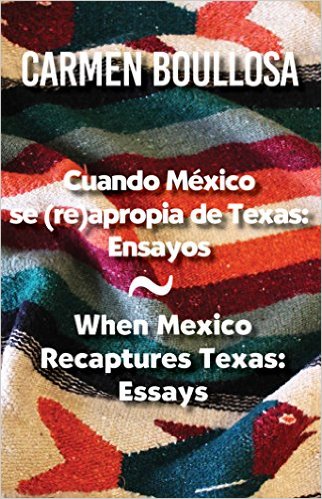The Arizona Children’s Uprising
El motín de los chamacos de Arizona
Carmen Boullosa
The story may seem bogus, but they say it’s true.
Here is my point of view:
A teacher of history and language arts in an Arizona public middle school is unable to attend his classes. He is replaced by a substitute. After listening to (so-called routine) school announcements on TV (which I find rather surprising), the kids refuse to repeat with the screen the (routine) pledge of allegiance to the flag of the United States of America.
“We are Mexicans!” they yell at the substitute. “This is the land the Gringos stole from us!”
The substitute demands that they speak English: “We are in the United States of America!”
“Well,” a student answers in perfect Southern drawl, without the slightest trace of a foreign accent, “you better learn the Spanish language and Mexican customs because this is, after all, Mexican territory.”
The sub is very annoyed by this answer. Exasperated, he reveals his vulnerability to the students; their words have pummeled him. Faking control, he tries to settle them down and have them follow the program left by their regular teacher.
“Let’s read a passage by Mark Twain. Open your books.”
The kids don’t want to open their books. When they finally comply, they tear out pages and turn them into projectiles that they proceed to throw at one another.
It strikes me that they are being guided here by Mark Twain’s Tom Sawyer, another thirteen-year-old who walks around barefoot like a little savage.
The substitute calls them to order. The youngsters are determined to eat him alive, and they continue with their tactics. They hit him with:
“We are all illegal here.”
“Gringos are racists.”
“Those crooks took our land.”
“They tricked us.”
Etcetera.
The sub goes home demoralized. He digs down deep and writes to his senator, outlining the troubling experience. He feels frustrated, more than anything. He hopes to one day be hired as a teacher or, better yet, as a professor. But for the time being, he earns nothing but breadcrumbs; he gets paid for what others won’t do. He’s a pinch hitter, and when he finally gets up to the plate, he finds nothing but Tom Sawyers!
But he has faith in himself. He’s convinced that he can hit a home run. If he were only given the chance… In the letter he writes to his senator, he tries his best. Following, “Dear Senator Russell Pearce,” he narrates plain and simple, without going into gratuitous detail, the unsavory events of his workday. Disobedient kids. It doesn’t occur to him to remark on the similarity between these rebels and Tom Sawyer, the intended subject of their lesson.
His brings his story to a close succinctly, with the following conclusions: “As a substitute teacher, I have learned that students in this district do not wish to receive an education, but rather to join gangs and become hooligans.” Again: Mark Twain does not cross his mind; the sub does not consider this author’s wit—nor does he quote him: “Education consists mainly of what we have unlearned.”
The sub continues his letter: “These students hate the United States of America and are determined to reclaim this region for Mexico. If we were able to ban the illegals from our schools, class size would be reduced considerably.” More grist for his mill. He closes with: “I applaud and support your efforts to put an end to this invasion. When the citizens of a country are forced to speak the invaders’ language, adopt their customs, and provide them with support, do we not in fact become the conquered?” He explains how disastrous it is that this “invasion” is turning his homeland into a third-world country. And once again, he applauds the senator.
And what a home run he scores. His letter is a hit when it is read out loud in the Arizona Senate on March 21. An anti-immigrant wave embraces it and spreads the word with pleasure.
I quote him here with a different intent, that of to underscoring his mismanagement of the classroom, of the kids’ disturbance… and to call to mind the author of Tom Sawyer, who put it so well: ” Every time you stop a school, you will have to build a jail.” Every student who is thrown out will become a menace to society.
These kids are no menace. They do not seem to be requesting gang membership, only a good teacher to steer them in the right direction.
***
*This essay is reprinted with permission from the publisher of Cuando México se (re)apropia de Texas: Ensayos / When Mexico Recaptures Texas: Essays by Carmen Boullosa (©2015 Arte Público Press – University of Houston).
 Carmen Boullosa (Mexico 1954) is a leading Mexican poet, novelist and playwright. She has authored more than 30 titles.
Carmen Boullosa (Mexico 1954) is a leading Mexican poet, novelist and playwright. She has authored more than 30 titles.
La anécdota parece ficticia, pero dicen que es cierta.
Así la veo yo:
El maestro de Historia y Lengua de una secundaria pública en Arizona no puede asistir a sus clases. Lo reemplaza un suplente. Después de escuchar los (dicen que rutinarios) anuncios en la televisión (que a mí me llaman a sorpresa), los chamacos se niegan a repetir con la pantalla las (rutinarias) frases de lealtad a los Estados Unidos de América.
—¡Somos mexicanos! —le gritan al suplente—, ¡éste es territorio que los gringos nos birlaron!
El suplente les exige que hablen en inglés, “¡Estamos en los Estados Unidos de América!”
—Pues —le contesta un alumno en perfecto inglés sureño, sin ápice de acento extranjero— más te vale que aprendas español y los modos mexicanos, porque a fin de cuentas estas tierras son de México.
Al suplente le disgusta sobremanera la respuesta. Con su enfado, trasluce vulnerabilidad a los alumnos, las palabras lo han hollado. Fingiendo control, intenta ponerlos en orden y hacerlos cumplir con la agenda que dejó el ausente.
—Vamos a leer unas páginas de Mark Twain. Abran sus libros de texto.
Los chamacos no quieren abrir los libros. Cuando por fin acceden, les arrancan hojas y las convierten en objetos arrojadizos que lanzan los unos a los otros.
Me parece que su guía aquí es el Tom Sawyer de Mark Twain, otro de trece años, que con pies desnudos deambula a lo salvaje.
El suplente los llama al orden. Los muchachos están decididos a almorzárselo, y siguen adelante con su estrategia. Le sorrajan:
—Aquí todos somos ilegales.
—Los gringos son unos racistas.
—Nos quitaron a la mala el territorio.
—Nos tomaron el pelo.
Etcétera.
El suplente vuelve a su casa desmoralizado. Saca fuerzas de flaquezas y escribe a su Senador, reseñándole la turbulenta experiencia. Está, sobre todo, frustrado. Espera algún día conseguir un puesto de maestro, o mejor todavía, de profesor. Pero ahora no tiene sino migajas, cobra por hora lo que otros dejan de hacer. Es un bateador de reemplazo, y cuando lo invitan a la cancha. . . ¡topa con puros Tom Sawyers!
Pero tiene fe en sí mismo. Está convencido de que él puede lanzar un homerun. Si le dieran una oportunidad. . . En la carta que escribe a su Senador, lo intenta. Empieza: “Estimado Senador Russell Pearce”. Le cuenta, de manera sobria, contenida, sin explayarse, cómo fueron los sinsabores del día laboral. La chamacada malportada. No se le ocurre anotar la similitud que hay entre estos rebeldes y Tom Sawyer, el supuesto objeto de estudio.
Termina escuetamente la narración y anota sus reflexiones: “Como maestro sustituto, he aprendido que los estudiantes en esta área no quieren recibir educación sino más bien pertenecer a una pandilla y ser gangsters”. De nuevo: no se le ocurre pensar en Mark Twain, no piensa en la rapidez de la inteligencia de este autor, ni lo cita: “La educación consiste sobre todo en lo que hemos desaprendido”.
El sustituto sigue en su carta: “Los estudiantes odian a los Estados Unidos, y están decididos a reclamar esta área para México. Si fuéramos capaces de echar fuera a los ilegales de nuestras escuelas, los tamaños de los grupos se reducirían”. Más agua para su molino. Termina con: “Aplaudo y apoyo sus esfuerzos por detener esta invasión. Cuando los ciudadanos de un país son forzados a hablar la lengua de los invasores, obligados a adoptar sus costumbres, orillados a apoyarlos, ¿no se convierten de hecho en conquistados?” Explica lo fatal, que esta “invasión” torne a su patria en un país del Tercer Mundo. Y de nuevo, aplaude al Senador.
Y sí que pega un homerun. Su carta es un hit cuando es leída ante el Senado de Arizona el 21 de marzo. La ola antiinmigrante la abraza y difunde con júbilo.
La cito yo aquí con otro ánimo, para subrayar el timón desgobernado de su aula, el alebreste de los chamacos. . . y recordar al autor de Tom Sawyer, que bien decía: Cada escuela que se cierra es a futuro una cárcel que se abre. Cada estudiante que echen fuera, será un peligro social.
Los chamacos no lo son ahora. No parecen estar pidiendo ser parte de una pandilla, sino un buen maestro, con inteligente timón.
***
*This essay is reprinted with permission from the publisher of Cuando México se (re)apropia de Texas: Ensayos / When Mexico Recaptures Texas: Essays by Carmen Boullosa (©2015 Arte Público Press – University of Houston).
 Carmen Boullosa (Mexico 1954) es poeta, narradora y dramaturga. Es autora de más de 30 títulos.
Carmen Boullosa (Mexico 1954) es poeta, narradora y dramaturga. Es autora de más de 30 títulos.










